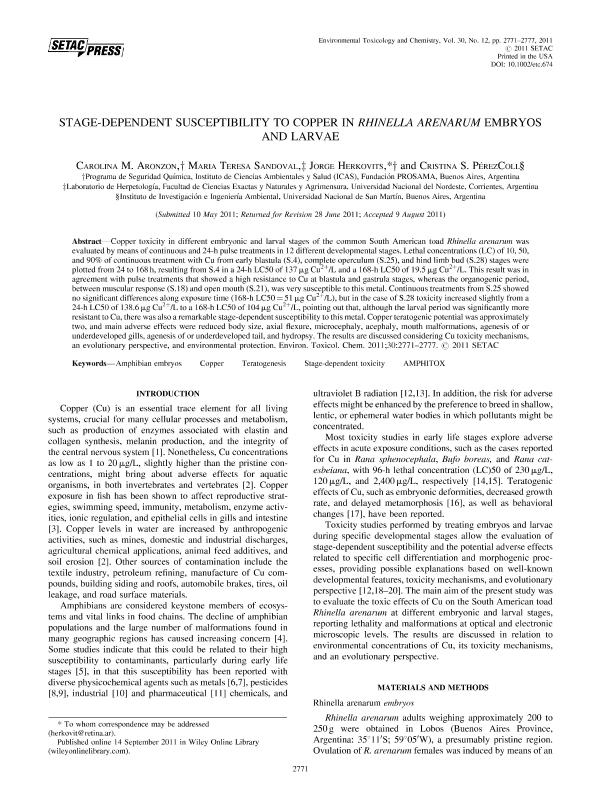Mostrar el registro sencillo del ítem
dc.contributor.author
Aronzon, Carolina Mariel

dc.contributor.author
Sandoval, María Teresa

dc.contributor.author
Herkovits, Jorge

dc.contributor.author
Perez Coll, Cristina Silvia

dc.date.available
2023-04-17T15:30:19Z
dc.date.issued
2011-12
dc.identifier.citation
Aronzon, Carolina Mariel; Sandoval, María Teresa; Herkovits, Jorge; Perez Coll, Cristina Silvia; Stage dependent susceptibility to Copper in Rhinella arenarum embryos and larvae; Society of Environmental Toxicology and Chemistry; Environmental Toxicology and Chemistry; 30; 12-2011; 2771-2777
dc.identifier.issn
0730-7268
dc.identifier.uri
http://hdl.handle.net/11336/194189
dc.description.abstract
Copper toxicity in different embryonic and larval stages of the common South American toad Rhinella arenarum was evaluated by means of continuous and 24-h pulse treatments in 12 different developmental stages. Lethal concentrations (LC) of 10, 50, and 90% of continuous treatment with Cu from early blastula (S.4), complete operculum (S.25), and hind limb bud (S.28) stages were plotted from 24 to 168 h, resulting from S.4 in a 24-h LC50 of 137 mg Cu2þ/L and a 168-h LC50 of 19.5mg Cu2þ/L. This result was in agreement with pulse treatments that showed a high resistance to Cu at blastula and gastrula stages, whereas the organogenic period, between muscular response (S.18) and open mouth (S.21), was very susceptible to this metal. Continuous treatments from S.25 showed no significant differences along exposure time (168-h LC50¼51mg Cu2þ/L), but in the case of S.28 toxicity increased slightly from a 24-h LC50 of 138.6 mg Cu2þ/L to a 168-h LC50 of 104 mg Cu2þ/L, pointing out that, although the larval period was significantly more resistant to Cu, there was also a remarkable stage-dependent susceptibility to this metal. Copper teratogenic potential was approximately two, and main adverse effects were reduced body size, axial flexure, microcephaly, acephaly, mouth malformations, agenesis of or underdeveloped gills, agenesis of or underdeveloped tail, and hydropsy. The results are discussed considering Cu toxicity mechanisms, an evolutionary perspective, and environmental protection.
dc.format
application/pdf
dc.language.iso
eng
dc.publisher
Society of Environmental Toxicology and Chemistry

dc.rights
info:eu-repo/semantics/openAccess
dc.rights.uri
https://creativecommons.org/licenses/by-nc-sa/2.5/ar/
dc.subject
COPPER
dc.subject
AMPHIBIAN DEVELOPMENT
dc.subject
STAGE DEPENDENT SUSCEPTIBILITY
dc.subject.classification
Ciencias Medioambientales

dc.subject.classification
Ciencias de la Tierra y relacionadas con el Medio Ambiente

dc.subject.classification
CIENCIAS NATURALES Y EXACTAS

dc.title
Stage dependent susceptibility to Copper in Rhinella arenarum embryos and larvae
dc.type
info:eu-repo/semantics/article
dc.type
info:ar-repo/semantics/artículo
dc.type
info:eu-repo/semantics/publishedVersion
dc.date.updated
2023-04-17T13:45:57Z
dc.journal.volume
30
dc.journal.pagination
2771-2777
dc.journal.pais
Estados Unidos

dc.description.fil
Fil: Aronzon, Carolina Mariel. Universidad Nacional de San Martín. Instituto de Investigación en Ingeniería Ambiental; Argentina. Consejo Nacional de Investigaciones Científicas y Técnicas; Argentina
dc.description.fil
Fil: Sandoval, María Teresa. Universidad Nacional del Nordeste; Argentina
dc.description.fil
Fil: Herkovits, Jorge. Consejo Nacional de Investigaciones Científicas y Técnicas; Argentina
dc.description.fil
Fil: Perez Coll, Cristina Silvia. Universidad Nacional de San Martín. Instituto de Investigación en Ingeniería Ambiental; Argentina. Consejo Nacional de Investigaciones Científicas y Técnicas; Argentina
dc.journal.title
Environmental Toxicology and Chemistry

dc.relation.alternativeid
info:eu-repo/semantics/altIdentifier/url/https://setac.onlinelibrary.wiley.com/doi/full/10.1002/etc.674
dc.relation.alternativeid
info:eu-repo/semantics/altIdentifier/doi/http://dx.doi.org/10.1002/etc.674
Archivos asociados
